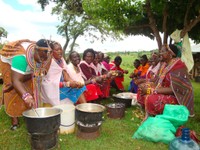A Maasai woman becomes a potato seed production pioneer Christine Nashuru cuts the figure of a traditional Maasai woman, tall and shy. She lives in the Transmara District of Kenya, situated in the southwestern part of the Rift Valley Province. Due to traditional values, Christine did not access formal education. But thanks to a training course led by the International Potato Center (CIP), she has pioneered the production of seed potato in her district. In 2010, Christine sold over 10.3 tons of seed potato, worth over US$4,000, and she is expecting more than 80 tons of seed from her 4 acres for 2011.
 This is a very surprising role for a Maasia woman. By tradition, the pastoralist Maasai are consummate cattle-herders. Cattle are a critical symbol of wealth and pride, as well as the main source of food and material. “I hope your cattle are well”, is a standard greeting.
This is a very surprising role for a Maasia woman. By tradition, the pastoralist Maasai are consummate cattle-herders. Cattle are a critical symbol of wealth and pride, as well as the main source of food and material. “I hope your cattle are well”, is a standard greeting.
But potatoes are taking on increased importance in Transmara District, and in Sub-Saharan Africa as a whole. Since 1994, potato production in Sub-Saharan Africa has more than doubled. In Transmara, it began in 2000, with potato grown as a kitchen garden crop. Farmers bought tubers from the local markets and used them as seed. However, potato yields of small-scale farmers in the region fall far short of their potential. The farmers face an inadequate supply of high-quality seed, coupled with their own limited awareness of better seed management practices.
In August 2009, Christine was selected to attend a course on potato seed production held in Nairobi and organized by CIP. She was one of 57 seed multipliers attending from outlying districts. The course focused on the use of three-generation (3-G) seed multiplication strategy.
The 3G seed strategy is geared to producing large numbers of minitubers through very rapid multiplication. The point is to yield sufficient, high-quality potato seed in three field generations, instead of the usual seven required. The rapid multiplication means production costs are lowered, and there is less chance of contamination in the seed from disease or pests.
CIP is leading 3-G projects in Kenya, Rwanda, and Uganda, in partnership with private and public partners at the national and regional levels. The collaboration with the private sector is key for increasing capacity, and broadening adoption of quality seed. This in turn helps accelerate the availability of improved varieties that are more adapted to local conditions and demands.
The project is fostering private adoption of the three-generation seed multiplication strategy and improved knowledge and skills leading to average yield increases of 20% for over 15,000 smallholder growers on potato production technologies and best practices.
As for Christine, ever since her training, she has never looked back. Not only is she driving better seed production in her district. She also has trained farmers in her region, mostly women, on seed and ware potato production and utilization.
Diana Keyua, one of the farmers trained by Christine, said, “Christine is now a darling of the village; she is like light put in a hill for all to see her success. In fact she has made us access seed at our doorstep and has trained us in potato production. Furthermore we now feed our families with the nutritive potatoes.”
Video “Seed for Change” about the role of potatoes in Africa:
http://www.youtube.com/watch?v=ZDdZN1_zibQ
